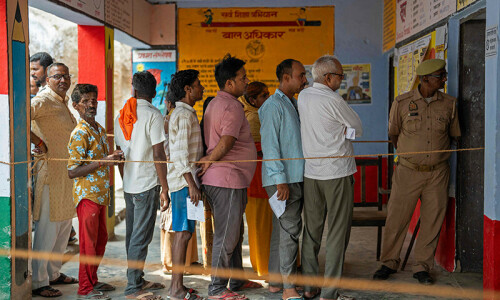THE death toll is shocking as is the seeming ease with which militants were able to attack a police training academy outside Quetta city; our thoughts must turn to the injured and the families of those who died. The first line of defence for much of Pakistan are this country’s police forces — often targeted, unduly vulnerable and unconscionably under-resourced across most of the country. Particularly in Balochistan, where the police are institutionally marginalised in much of the province and where other security forces dominate, the plight of the law enforcers was already grim. Care then should be taken to help the larger police community recover from this devastating attack and protect morale. More than seven years since the Manawan Police Academy attack in Lahore, the failure to protect law enforcers in their own training camps is a grim testament to the state’s failure to improve its institutional capacities.
Necessary also is a familiar, but important, set of questions to be asked of the security establishment when it comes to the safety of Quetta. After more than a decade of near-total control of the security policy in the province, all that seems to have changed is who is automatically blamed for particular acts of violence. Where earlier Baloch separatists were principally blamed, now alleged Indian- and Afghan-sponsored militants are reflexively accused. To be sure, Balochistan remains a hotbed of armed Baloch dissidents and hostile foreign interests. It is not a figment of a febrile imagination that outside elements continue to not only support some Baloch insurgents, but also seek to destabilise Pakistan in a murky tit-for-tat strategy. However, none of that changes the reality that much of Balochistan is effectively a vast no-go area for most Pakistanis and that security strategies are unable to establish normality, let alone peace, in the province. Part of the problem is surely the knee-jerk reaction to major incidents, typified yesterday by yet another high-level security meeting in Quetta, where once again old talking points appear to have been rehashed.
Finally, with competing claims of responsibility by IS and a faction of Lashkar-i-Jhangvi for the attack, it is time to acknowledge that it perhaps does not matter which splinter or sub-group was the architect of the attack. Zero tolerance is the only way ahead — a policy both in principle and in practice when it comes to taking on militant groups. While every attack does demand a detailed inquiry, it should also solidify the state’s resolve to dismantle all militant groups. Blaming sanctuaries across the border or even foreign support is a political game when strong action is called for. The counter-insurgency successes in Fata are a symbol of what is possible when commitment is total and resolve unshakeable. Militants want to terrorise the public and make the state tremble; it is time the tables were emphatically turned.
Published in Dawn October 26th, 2016










































